Define your ministry’s vision and goals: Before choosing curriculum, clarify what you want your students to learn and experience during their time in your ministry.
Prioritize Bible-centered and flexible curriculum: Look for material that’s grounded in Scripture and adaptable to your group’s unique size, context, and teaching style.
Evaluate resources for spiritual habit formation: Choose a curriculum that provides tools like devotionals, discussion guides, and application steps to deepen students’ faith.
Consider your church’s theology and needs: Select a curriculum that aligns with your theological perspective and fits your ministry’s structure and budget.
Choosing the right youth ministry curriculum can feel like an uphill battle, right? There’s so much out there, and it’s hard to know what’s actually going to connect with your students and make your life easier as a leader. I’ve been there, and I know how quickly things can spiral when you don’t have a solid curriculum in place:
- You spend countless hours scrambling to prepare lessons that feel disconnected or rushed.
- Your students disengage because the material doesn’t hit home or challenge them spiritually.
- You feel burnt out, juggling too many responsibilities without a clear teaching plan to guide you.
These struggles often happen because we try to do everything on our own or don’t have resources that meet both our needs and our students’ needs. But the good news? The right youth ministry curriculum can change everything. It can save you time, deepen your students’ understanding of God, and give you a framework that brings consistency to your ministry.
Not only have I pulled together seven recommendations for youth ministry curriculum for you and your leadership team to consider, but I'll also walk through a simple, clear step-by-step process for choosing the 'just right' curriculum for your students.
What Is A Youth Ministry Curriculum?
A youth ministry curriculum is a structured plan designed to help you teach and disciple students in their faith.
It provides lessons, activities, and resources that make it easier to communicate God’s Word in a way that connects with teenagers. Instead of starting from scratch every week, a curriculum gives you a foundation to build on, so you can focus on building relationships with your students.
Engaging, effective curriculum includes THESE key elements :
- Bible-centered teaching that focuses on Scripture and points students to Jesus.
- Discussion-based learning that encourages teens to ask questions and wrestle with real-life issues in a safe environment.
- Personal application steps that challenge students to live out their faith in everyday life.
- Interactive activities (games, videos, ice breakers, etc) to capture attention and reinforce the lesson.
What sets a great curriculum apart is its flexibility. No two youth groups are the same, so it’s important to choose one that can be adjusted to fit your church’s unique context. Look for something that allows you to tweak the content, whether you’re working with a group of 5 or 50, a mix of new believers and longtime church kids, or anything in between.
Curriculum usually has scriptures from the Bible (about giving, worship, prayer, etc) organized around a theme. There could be extra stories or references from outside of the Bible to complement the material. This material typically also has questions, call to actions, and the like to go beyond simply talking about a lesson.
Youth ministry curriculum is your go-to method of teaching the next generation of students and the guiding point for many churches around the world, no matter if you need it for your small group or to empower both your adult volunteers and student leadership you are developing .
Our Top 7 Recommended Youth Ministry Curriculums.
With so many youth ministry curriculums out there, it can be overwhelming to figure out which one is the best fit for your group. To help you navigate the options, I’ve narrowed it down to six strong options.
These curriculums stand out to me because of their flexibility, quality, and ability to adapt to different church settings.
1. G Shades Curriculum

G Shades stands out for its unique approach to teaching students to see their everyday lives through the lens of the gospel. With each purchase, you get interactive small group discussions, engaging video messages, volunteer/parent training resources, and weekly games,.
G Shades equips youth pastors with everything they need to disciple students without overwhelming their schedule (or their budget).
Free Trial: G Shades
G Shades is dedicated to setting a new standard for youth ministry curriculum. Try it out for free!
2. Live Youth Curriculum
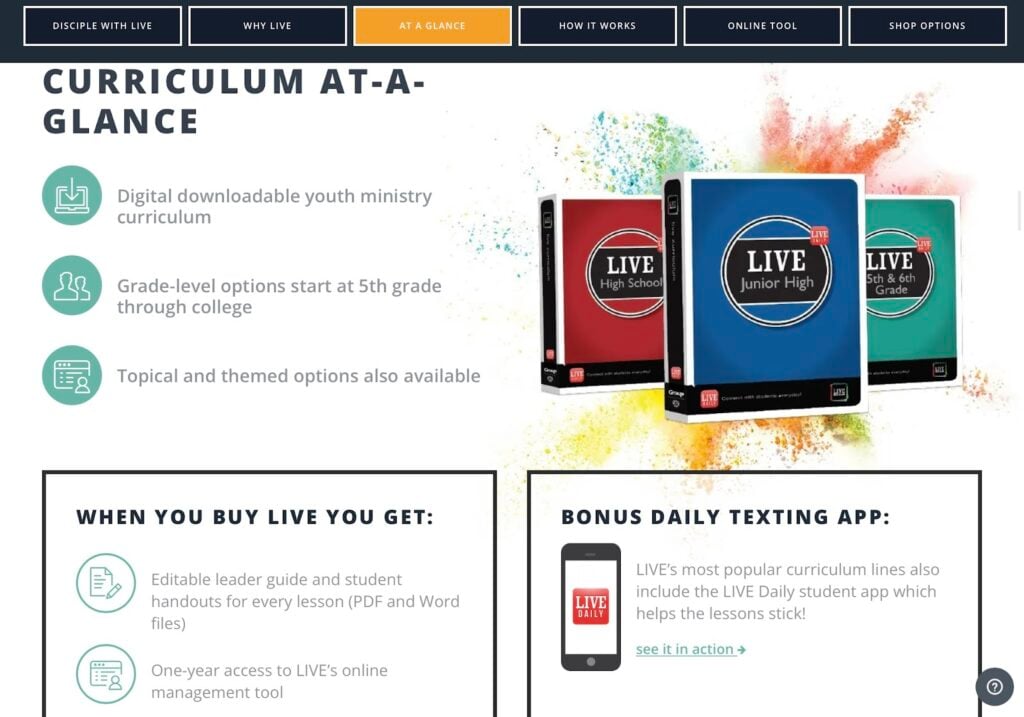
What makes it shine is its focus on leading students to know and love Jesus. The curriculum incorporates a variety of teaching methods, including student-led discovery, lecture-style lessons, and conversational approaches. This makes it easy to adapt to different group dynamics or teaching styles.
If you’re looking for a curriculum that’s flexible and Christ-centered, this is a strong contender.
3. Grow
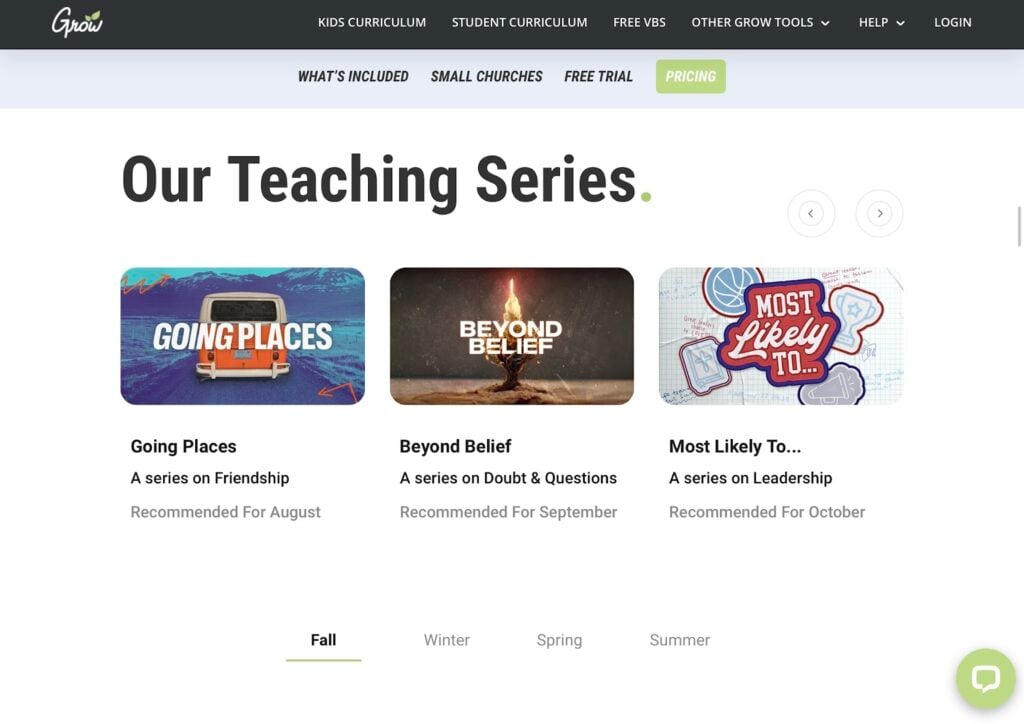
Prioritizing growth, the Grow Curriculum emphasizes more than just growing your group’s numbers. It focuses on long-term spiritual growth for students, helping them develop character and deepen their walk with God.
The Grow curriculum also includes resources for planning, training, and even outreach, making it a comprehensive solution for leaders who want to equip their students for a lifelong faith journey.
Grow Curriculum: Free Trial
Looking to sample the Grow Curriculum? They offer a free month of curriculum as a sample. Check it out - it may be a great fit for you and your team!
4. Rooted
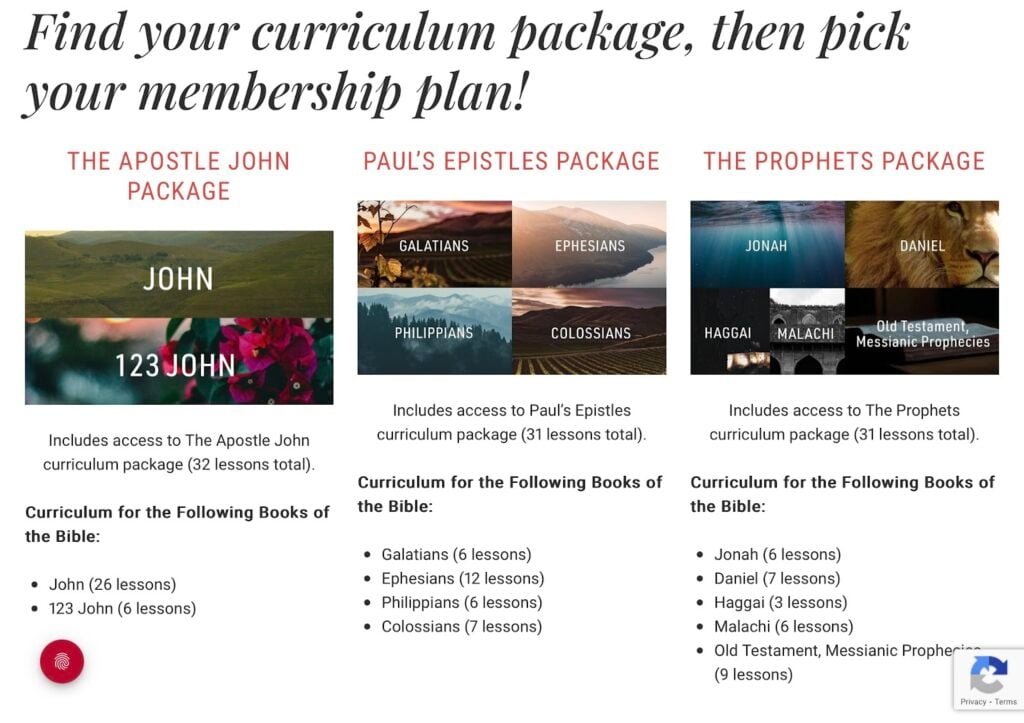
Rooted is a straightforward curriculum built by youth pastors, for youth pastors.
What sets Rooted apart is its collaborative foundation—it’s been developed with input from leaders across different contexts. This curriculum offers a full package, including videos, illustrations, and engaging lessons.
Rooted is an excellent choice if you want a reliable, community-driven resource with practical tools for discipling your students.
5. Teen Compass
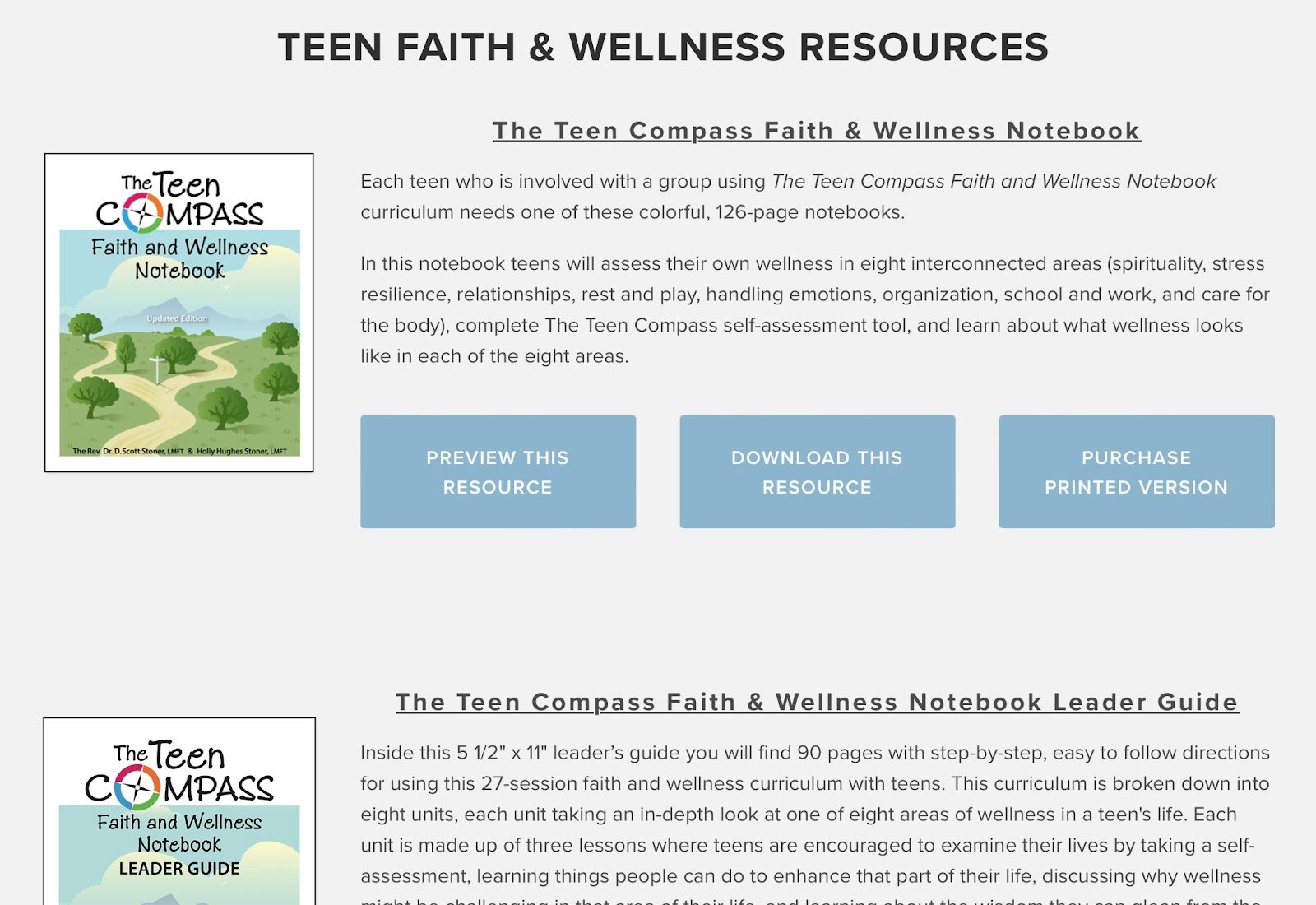
If you're looking for something that's stood the test of time, Teen Compass can be trusted.
This resource focuses on the basics, with a traditional structure that includes a leader guide for pastors and a workbook for students. It’s designed to encourage interaction and reflection, making it a good fit for groups that thrive on structure and hands-on activities. If you’re looking for something simple yet effective, Teen Compass delivers.
6. Deep Discipleship
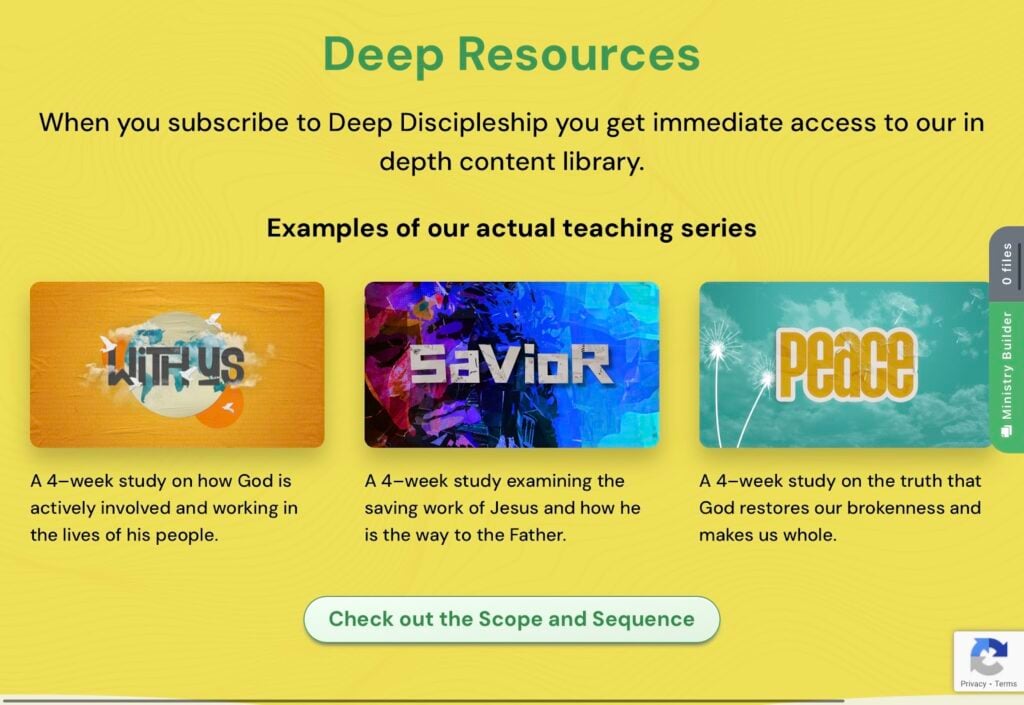
This discipleship curriculum is a newer program with a clear focus on spiritual growth.
As the name suggests, this curriculum is all about fostering deep, intentional discipleship. It’s designed to include everyone in the process—students, parents, and leaders—creating a holistic approach to ministry.
With its emphasis on building biblical principles in preteens and teens, Deep Discipleship is an excellent choice for ministries focused on cultivating lasting faith.
The Deep Discipleship team is currently offering a free trial of both their junior and senior youth ministry curriculums:
7. YM360
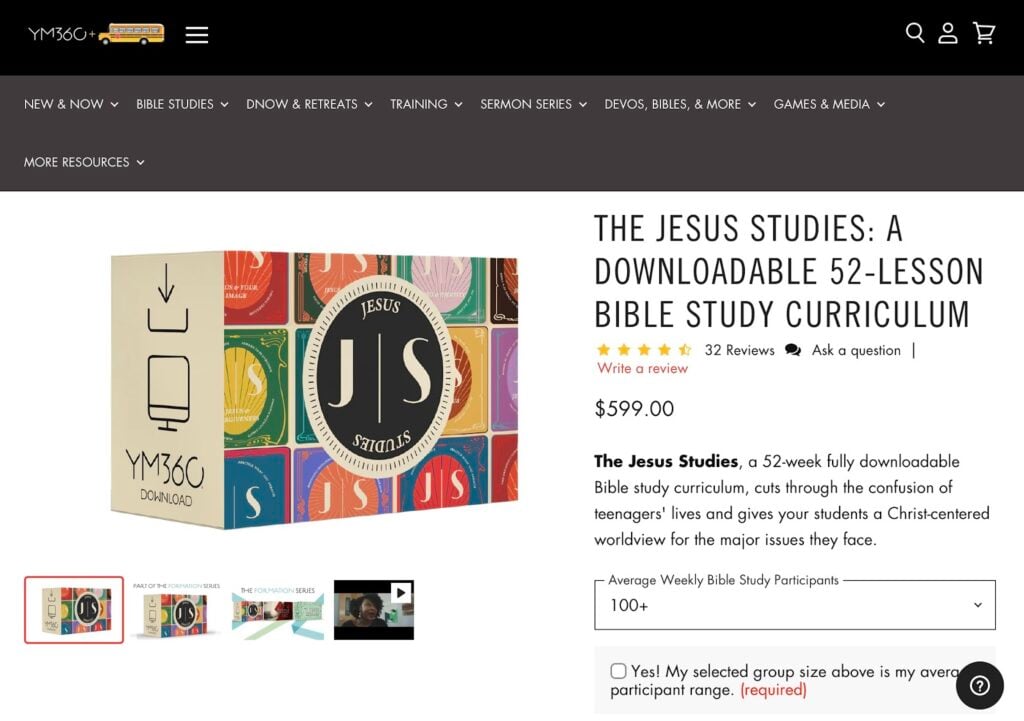
YM360 is one of the most comprehensive and widely used curriculums available.
This curriculum is known for its high quality and extensive resources. It offers foundational Bible studies, thematic lessons, and even materials paired with movies or specific topics.
While it’s one of the pricier options on this list, the depth of content and expert design make it worth considering if your budget allows. It’s ideal for leaders looking for an all-in-one, professionally crafted resource.
Benefits of GREAT Youth Ministry Curriculum
Using a good youth ministry curriculum can transform your ministry in ways you’ll notice right away. Here are some of the biggest benefits you’ll see when you have the right tools in place:
- You’ll save time and reduce stress. Instead of scrambling to plan lessons last minute, you’ll have a clear, ready-to-use framework that keeps you organized and focused. This frees up your time for more personal ministry, like building relationships with your students and their families.
- Your teaching will be more consistent and impactful. A good curriculum gives you a logical flow of lessons, making it easier for students to connect the dots in their faith journey. When the teaching builds on itself week after week, your group will grow deeper together.
- Students will engage more with the content. The best curriculums are designed to meet teens where they are, using discussion-based learning and real-life applications to make the Bible come alive. Students are more likely to pay attention—and to take the message to heart—when the material speaks directly to their questions and struggles.
- You’ll feel equipped and confident. Good curriculum takes the guesswork out of planning and gives you tools you can trust. Knowing you have a solid plan helps you lead with confidence, which can energize your whole ministry.
When you invest in the right resources to grow and develop your youth group, you’re not just making things easier for yourself—you’re also creating a space where students can grow in their relationship with Jesus. A good curriculum is a tool that helps you focus on what really matters: discipling the next generation.
5 Simple Steps to Choose A Youth Ministry Curriculum
Choosing a curriculum is a big decision, but by following these steps, you’ll be well-equipped to find a resource that’s biblically grounded, Jesus-centered, and tailored to your church’s needs. With the right tools in place, you’ll set your ministry up for lasting impact!
These five steps will help you and your leadership team choose a good, biblically focused, Jesus-centered curriculum for your youth group:
Step 1. Define your ministry's goals and vision
What do you want your students to know, believe, and experience during their time in your ministry? Clearly articulate your goals for one, three, or even seven years down the road. For example...
- Do you want them to know the key themes of the Bible?
- Do you want them to deepen their personal relationship with Jesus?
- Do you want them to understand how their faith applies to daily life?
Ensure your youth ministry goals align with your church’s overall mission and vision for discipleship. A clear vision will make evaluating curriculum options much simpler
Step 2. Evaluate the curriculum’s content and structure
A good youth ministry curriculum should be centered on God’s Word and designed to help students grow closer to Jesus. Look for resources that:
- Cover both the Old and New Testaments.
- Address real-life issues teenagers face, like relationships, identity, or peer pressure.
- Include key resources such as lesson plans, leader guides, discussion questions, and parent follow-ups.
Step 3. Consider your church's unique context and needs
No two youth groups are the same. No two churches are the same - identifying a curriculum that can be adapted to your students' unique needs is crucial. Think about your:
- Group size: Is the curriculum flexible for a small group setting or a larger crowd?
- Meeting frequency: Does it provide enough material to cover weekly, biweekly, or even occasional gatherings?
- Teaching style: Do you prefer structured lessons, interactive discussions, or hands-on activities?
- Specific challenges: Are there social or cultural challenges that many of your teens are wrestling with?
Finding a curriculum that matches your ministry’s rhythm will make it easier to connect with your students and equip your leaders.
Step 4. Review the theological alignment
Make sure the curriculum reflects your church’s theological perspective. Take time to research the creators—what’s their view of Scripture, and how do they approach discipleship? Read through lesson examples to confirm the teaching aligns with your church’s beliefs and values. If the curriculum introduces ideas or interpretations that don’t match your theology, it may cause confusion for both leaders and students.
Step 5. Assess practical factors
Finally, consider the practical details that will impact your ministry. Ask these questions:
- Does the curriculum fit within your budget?
- Is it adaptable for different settings and leader preferences?
- Does it provide leader support, like training videos, presentation slides, or social media tools?
A curriculum that’s both practical and comprehensive will make your ministry more effective and reduce the stress of preparation.
Youth Ministry Curriculum: Frequently Asked Questions
1. How do I know if a curriculum is right for my group?
Evaluate your group’s size, needs, and teaching style. Look for flexibility in the curriculum and whether its theological perspective aligns with your church. Trial lessons or samples can help you decide.
2. Can I adapt a curriculum for a small or large group?
Yes, many curriculums are designed to be flexible. Look for those offering options like discussion guides for small groups or materials for large-group presentations.
3. What if my church has a limited budget?
Some curriculums offer free trials or affordable pricing tiers. You can also supplement purchased materials with free resources from trusted ministry websites.
4. Should I involve my leadership team in this decision?
Absolutely. Collaborating with your team ensures the curriculum aligns with your church’s overall discipleship vision and helps get everyone on the same page.
5. How often should I evaluate or change my curriculum?
Consider revisiting your curriculum every year or two to ensure it’s still meeting your group’s needs and fostering spiritual growth. Seeking feedback (both from your adult youth leaders and your students) is also wise!
Final Thoughts
Join The Lead Pastor newsletter for resources and tools that help sharpen and elevate your management and administrative capabilities!
We'd love to have you.








